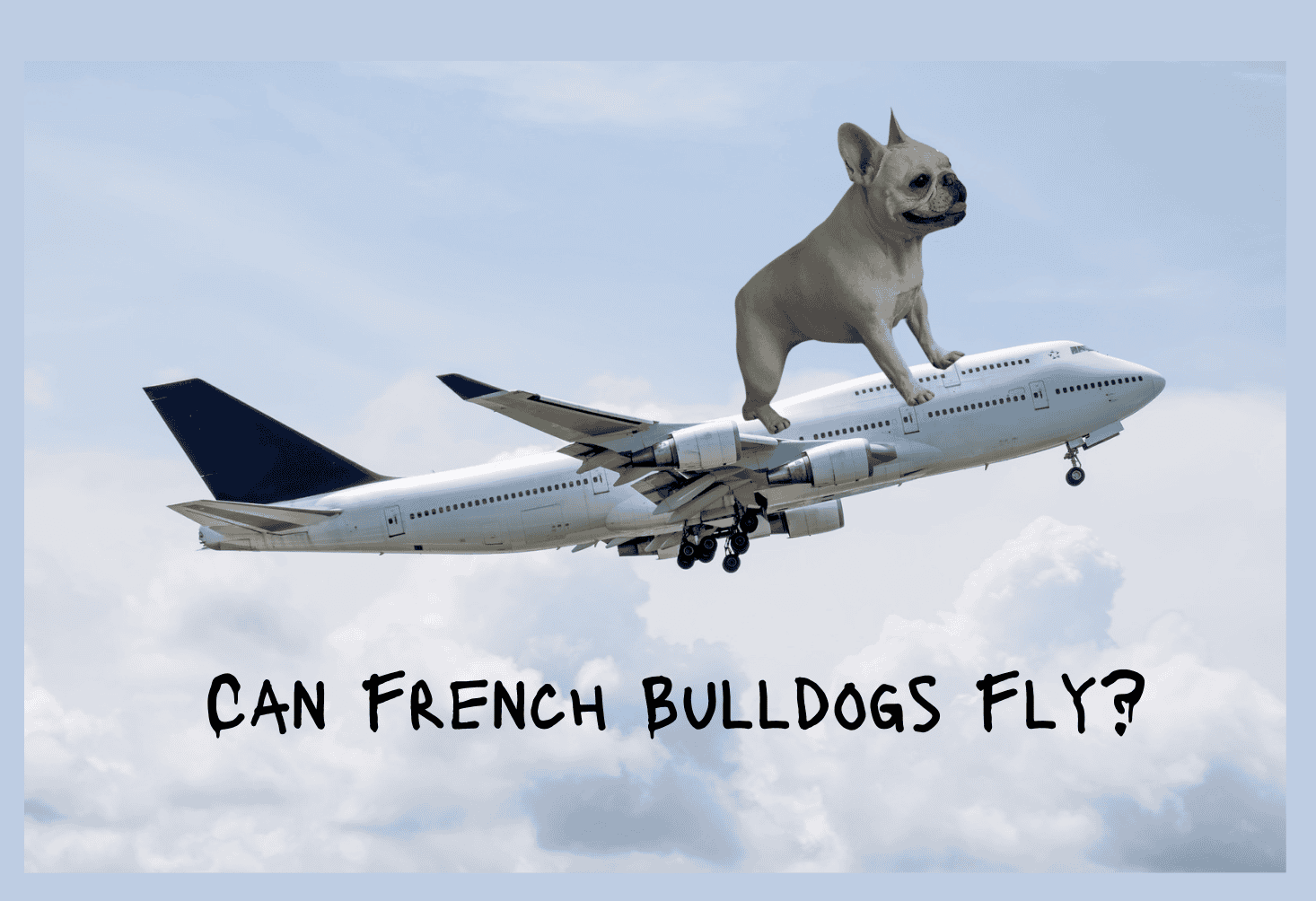French bulldogs, with their excellent bat ears and cute smoosh-faces, have become the most popular dog breed in the US! But for our goofy, loving, and loyal dogs, air travel can be a risky proposition. French bulldogs (and all of the other 23 brachycephalic, or short-headed breeds) have snub noses and narrow airways, making them susceptible to breathing difficulties. Understanding the risks, challenges, and airline policies for your frenchie is critical when planning a trip involving air travel.
I’ve traveled on many airlines, and across the world with my frenchie, Helga, and here are my best tips, tricks, and some critical information for flying safely with your frenchie.

Can French Bulldogs Fly in the Cargo Hold?
The cargo hold of an airplane is a stressful environment for any dog. But for brachycephalic breeds like French bulldogs, pugs, and Shih Tzus, it can be downright dangerous, and sometimes even deadly. Here’s why:
Temperature Extremes
Cargo holds of the vast majority of airlines are not climate-controlled. Extreme heat or cold can exacerbate breathing problems for brachycephalic dogs because they are less able to regulate their body temperatures because of their short faces.
Reduced Oxygen Levels
Frenchies and other brachycephalic breeds have lower oxygen levels in their blood, even on a regular day. But cargo holds have lower oxygen levels than the cabin, creating a potentially risky situation.
Stressful Environment
The loud noises, vibrations, unfamiliar environment, and presence of other dogs in the cargo hold can trigger anxiety and panic attacks, causing panting and overheating.
Limited Monitoring
There’s no ability for you or the flight crew to monitor your dog’s condition or assist them if they are in distress during the flight.
Health Risks
The factors listed above combined can lead to serious health risks, including:
Brachycephalic Obstructive Airway Syndrome (BOAS): This condition can worsen during flight due to stress and reduced oxygen. Signs of BOAS include labored or noisy breathing, and cyanosis which presents itself as bluish-colored gums, indicating a lack of oxygen in the blood.
Heatstroke: Because frenchies have difficulty regulating their body temperature, hot cargo holds can lead to potentially fatal heatstroke especially in warmer weather. Some airlines institute “heat embargoes” during the summer months, which means they will not allow any dogs in the cargo hold at all because of the risks.
Respiratory Distress: The combination of stress, low oxygen, and BOAS can cause severe respiratory distress that could require emergency veterinary care upon landing, or in tragic circumstances a death during the flight. Our worst nightmare.
Because of these risks, and tragic and deadly situations that have happened in the past, most airlines have entirely banned brachycephalic breeds, including french bulldogs, from flying in cargo. And frankly, even if you find an airline that allows your frenchie to fly in cargo, it’s a risk you do not want to take.
Can French Bulldogs Fly in the Cabin?
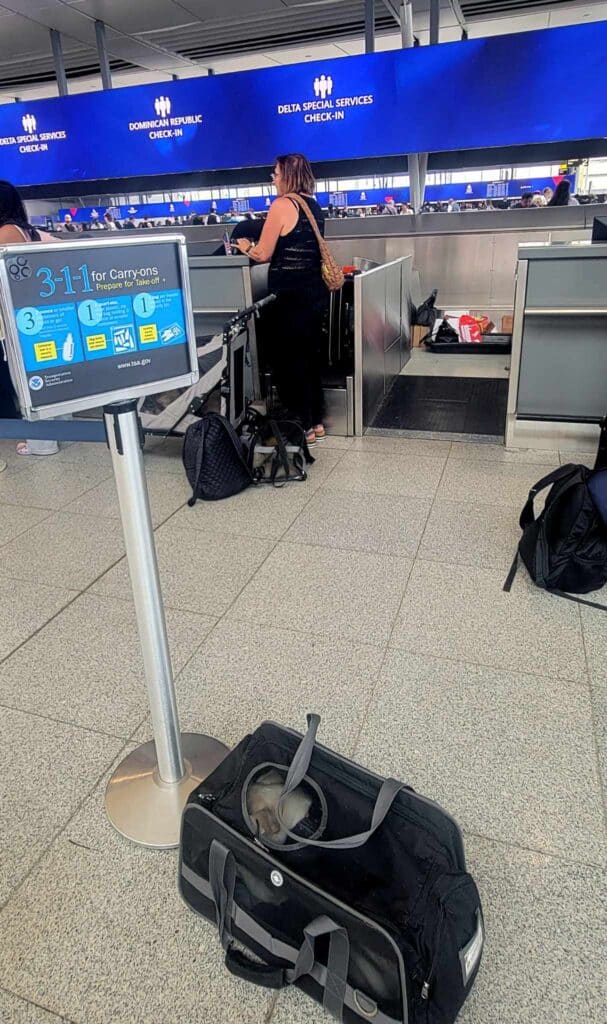
Thankfully, airlines that permit dogs in the cabin allow frenchies and other brachycephalic breeds to fly this way, provided they meet certain criteria:
Size and Weight Restrictions
Your dog and their carrier must fit comfortably under the seat in front of you. Some airlines (especially outside the US) have specific size and weight limits, so always check their pet policy before booking.
There are several airlines in the US that don’t have a specific weight limit, but do require that your dog is comfortable in an airline-approved soft-sided carrier that fits under the seat in front of you.
If your frenchie is too large to fit under the seat, there are a few airlines that will allow you to purchase a passenger ticket for them. Some allow you to buy a “comfort seat” but that still mens your frenchie must be able to fit under the seat in front of the empty seat you buy. More comfortable, yes, but it doesn’t help if you have a large frenchie who can’t fit there. Still there are a couple airlines that will allow you to either put the carrier on top of the seat next to you, or allow free range for your frenchie. The latter is usually expensive. Check out all the options and the 10 Airlines That Will Let You Buy a Seat for Your Dog.
Health Certificate and Microchip
A recent health certificate from your veterinarian, typically within 10 days of travel, is required for international and domestic US overseas travel, like Hawai’i. Some airlines and flights will also require your dog to be chipped. Always do your research about the airline you are flying with, and talk to an actual human who can answer your questions.
Airline-Approved Carrier
The carrier must be well-ventilated, escape-proof, and meet the airline’s size restrictions. Always go for a soft-sided carrier which is much easier to manipulate and fit under the seat. You will easily be able to find a carrier that meets airline specifications.
We recommend this lightweight well-ventilated airline approved carrier.
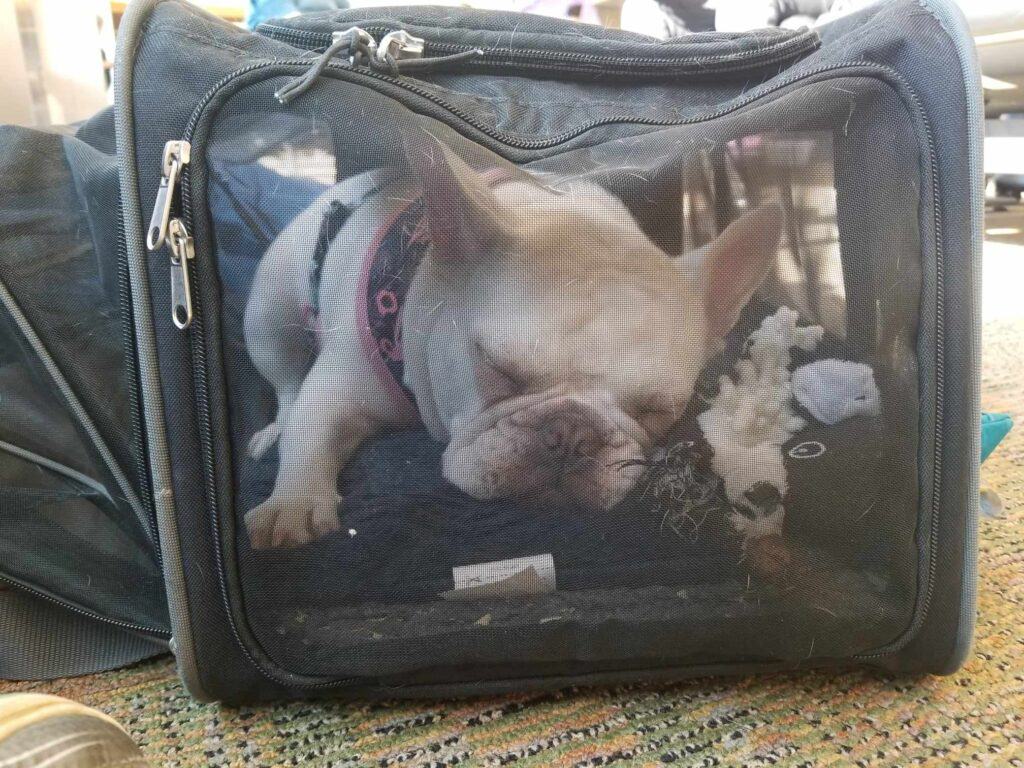
Tips for a Smooth Flight With Your Frenchie
The Adventure Lion contains affiliate links and is a member of the Amazon Services LLC Associates Program. If you make a purchase using one of these Amazon links, we will receive a small amount of compensation at no extra cost to you.
- Acclimate Your Dog to the Carrier: Get your dog used to spending time in their carrier well before travel day. If your frenchie is anything like mine, just keep putting treats in there and they will consider it one of their favorite places on Earth in no time!
- Find out if the airports you’re using have pet relief areas, and where they are. Try to give your dog a chance to go just before boarding.
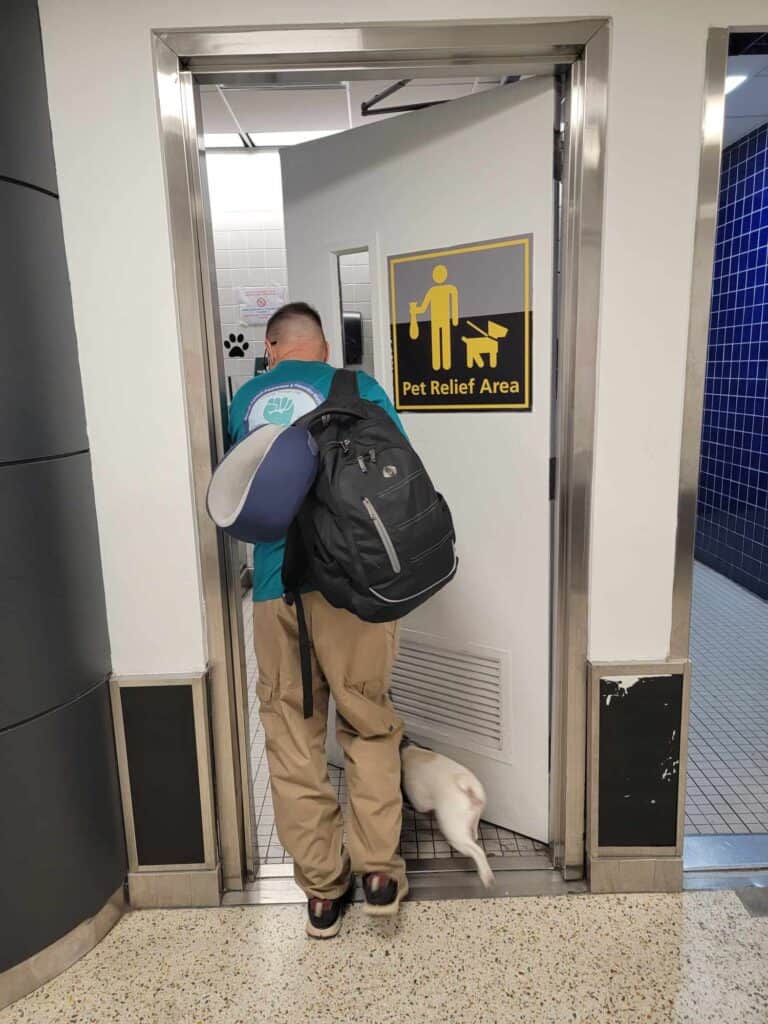
- Hydration: Most airlines will advise that you don’t give your dog food or water for several hours before a flight to minimize accidents. And while we definitely restrict feeding (except for a few treats during flight), it’s important to keep an eye on your frenchie and offer water if it’s warm or if they feel or act like they are hot. Panting is a definite sign to give some water. You’ll have to decide on the right amount based on the circumstances and the duration of the flight, but dehydration can spell trouble.
- Exercise Before Flying: If weather permits, and you have a high-octane frenchie, try to have a good play session or a long walk at some point before the flight. It will relax them and make it easier for them to sleep.

- Calming Techniques: It may not be a good idea to give your brachycephalic doggo sedatives that slow breathing. Ask your vet whether a mild sedative or maybe CBD is appropriate for your situation. Sniffing and licking are also great ways to calm your dog. A slow walk around, letting your dog sniff everything they want works well. And a “licky mat” with peanut butter will keep them busy and happy while calming them at the same time.
- Cool Tools for Your Frenchie: Our frenchies may think they are invincible, but they need some special help especially if you are flying in the summer months. Gel cooling pads and vests, or cooling scarves that use water are great to have. So are battery operated mini-fans with water mist. Panting is a sign you need to take some action to cool your baby down. You can also use cool water straight from the bottle on their neck and belly.
Choosing a Frenchie-Friendly Airline
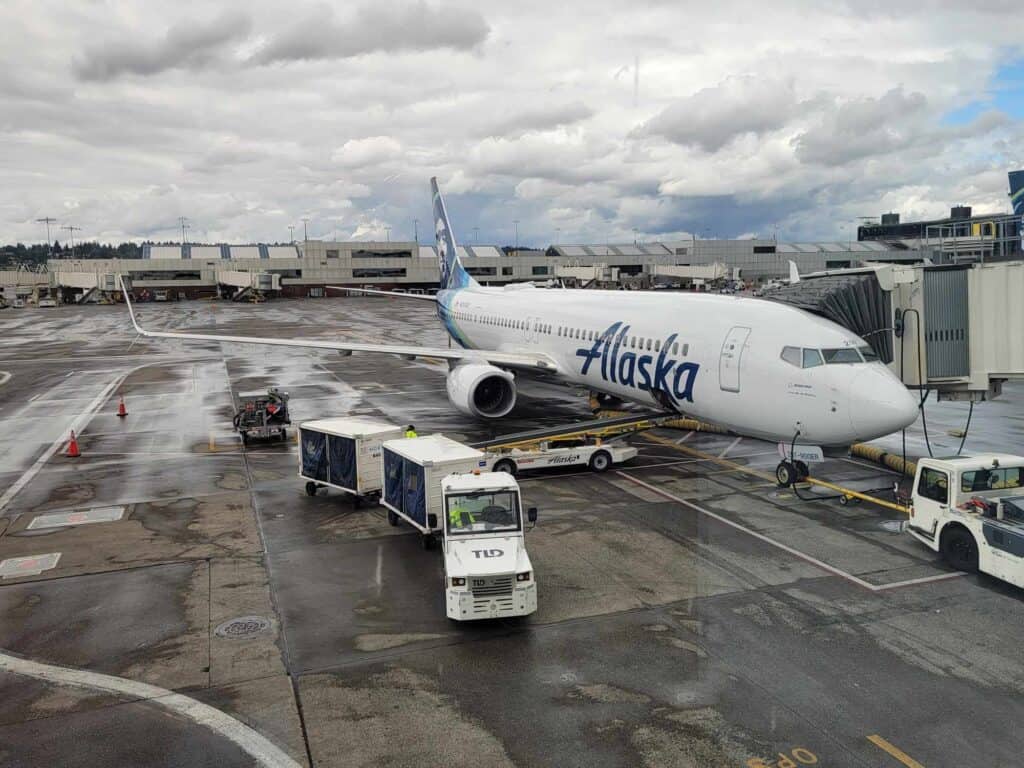
Not all airlines are created equal when it comes to flying with brachycephalic breeds. Here are some airlines known for being more accommodating to French bulldogs and other snub-nosed pups:
- Alaska Airlines: Click the link to read my whole review of flying with your in-cabin dog on Alaska Airlines
- American Airlines: Allows some brachycephalic breeds in the cabin meeting size and weight restrictions, with a health certificate.
- Delta Airlines: Click the link to read my whole review of flying with an in-cabin dog on Delta Airlines.
- Southwest Airlines: Click the link to read my whole review of flying with an in-cabin dog on Southwest Airlines.
- JetBlue: Allow small snub-nosed breeds in the cabin under the seat in front. You can also purchase a seat for your dog but they must remain in the carrier while in the seat.
- European Airlines: European Airlines are much more restrictive with weight and size of your in-cabin dog. Our frenchie, Helga just barely makes the weight requirement for even the more permissive European Airlines. You can read about those airlines and their weight requirements in this article.
Keep in mind: Airline policies can and do change. Always consult the airline directly and well in advance of your travel for the most up-to-date information about their policy and requirements.
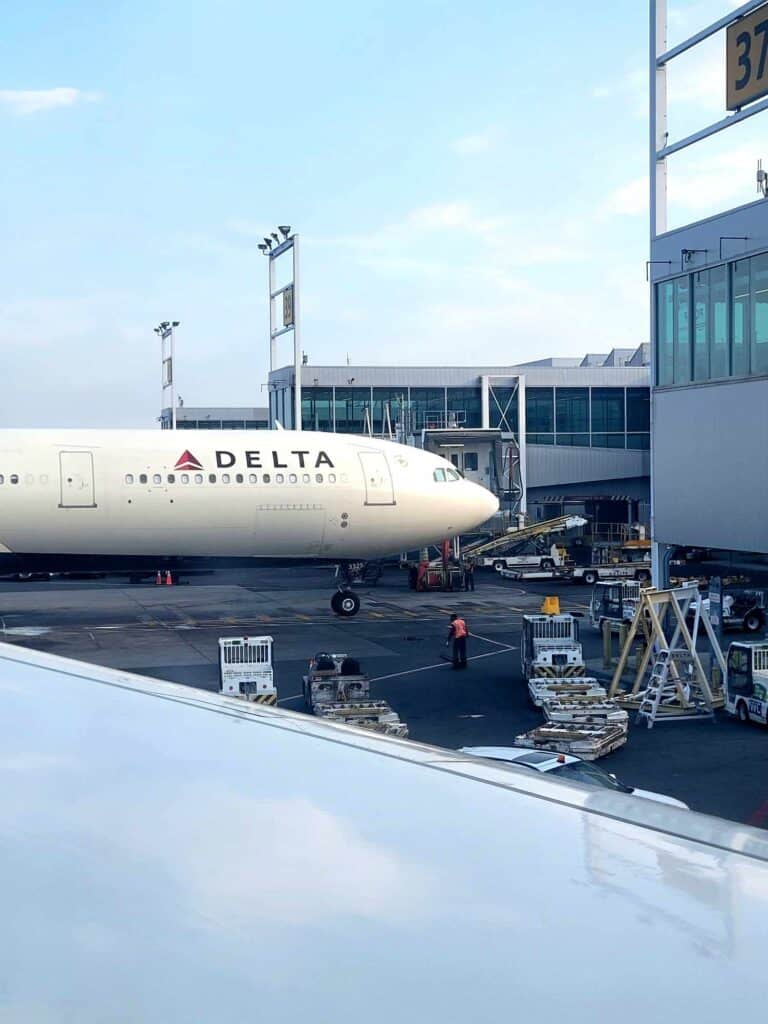
Alternative Travel Options for Your Frenchie
If commercial airlines are not the best option for you, several alternative travel methods can get you and your frenchie to your destination safely and comfortably.
Road Tripping
This classic option offers tons of flexibility and control over the travel environment. I can tell you from first-hand experience, Helga the frenchie is a huge fan of the road trip! We even did an epic 16-day road trip through Italy together, and it was a ton of fun! For best results:
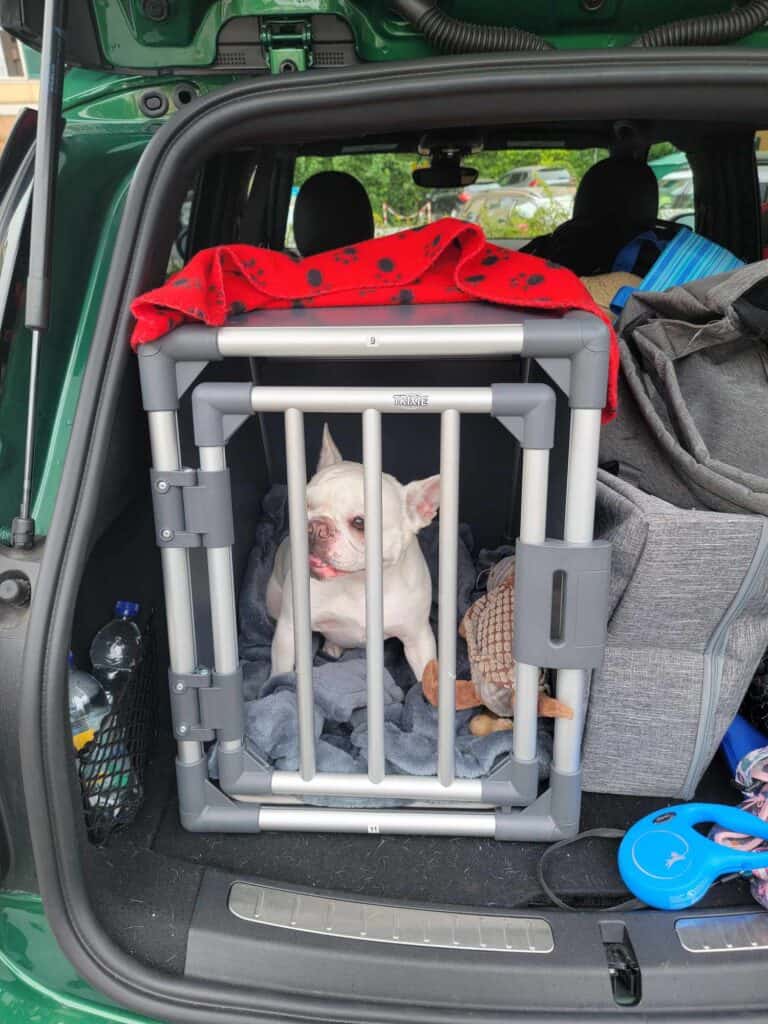
- Plan Your Route with Lots of Rest Stops: We schedule breaks every 2-3 hours so Helga can stretch, sniff, do her business, and stay hydrated.

- Secure Your Frenchie in a Carrier or Harness: Never let a frenchie roam freely in a car! You think they cause havoc at home! Use a crate or carrier secured in the back seat, or a harness attached to a seatbelt anchor.
- Maintain a Comfortable Temperature: Never leave a frenchie (or any dog) unattended in a warm or hot car, even for a short period! Use air conditioning or a pet cooling mat during warm weather. Make sure your frenchie’s crate or seat isn’t in direct sunlight, or provide a sun shade for the crate or window. Keep your ears open for panting, and cool that puppy off if you hear it.
- Bring Their Favorite Stuff: Pack favorite toys, bedding, and food/water bowls to make them feel comfortable and reduce stress.
Pet Transport Services
There are professional pet transporters who specialize in safely transporting animals across long distances. Oftentimes people in the military, or those who are moving overseas will utilize these services. They typically use a climate-controlled environment from start to finish, and have experienced pet handlers who ensure your dog’s well-being during the journey. It may cost you a pretty penny though, sometimes in the thousands of dollars. But if you’re moving and you have a big ol’ frenchie, it could be the answer you need!
Train Travel
While not as widely available as airplanes, some train companies like Amtrak do allow a limited number of pets on board, with size restrictions, and there are no pets allowed in Business Class or the Café car. They must remain in their carrier at all times and under the seat. You can check out Amtrak’s pet policy and research routes and restrictions at this link.
In Europe the rules for dogs on trains are much more relaxed. Even larger dogs can utilize trains. Every country and train line is slightly different, so do your research before you book, but you are likely to be pleasantly surprised!
If a frenchie friendly airline doesn’t service the city you plan to visit, it’s very likely you can fly into another city and catch a train to your final destination.
Private Charter Flights
If price is no object, there’s always a private charter flight for maximum comfort and control over the environment! Charters can accommodate specific needs, including temperature adjustments and in-flight monitoring of your dog. And let’s face it, your frenchie would feel completely entitled to this!
When considering alternatives to commercial flights, always prioritize your dog’s health and well-being. You and your vet know your frenchie best, and what they can tolerate safely. Choose an option that minimizes stress and ensures a comfortable travel experience where you (or a professional pet transporter) can be with them at all times, and make sure they’re doing okay.
Planning for a Smooth Journey: Pre-Travel Considerations
Regardless of the travel method you choose, planning ahead is critical for a stress-free trip with your Frenchie. Here are some essential steps:
- Schedule a Veterinary Check-Up: Get a vet appointment well in advance of your air travel. Tell your vet about your travel plans including destination and length of flight, and make sure your frenchie is healthy enough to travel. Get a health certificate if required by your chosen airline, destination, or pet travel service. And if you are traveling to Europe, make sure you have carefully scheduled your vet appointment so your paperwork comes within the 10-day window just prior to your travel.
- Update Vaccinations: Make sure your frenchie’s vaccinations are current and obtain any additional vaccinations or deworming treatments necessary for your destination (if traveling internationally from Europe or the US, or to Hawai’i).
- Paperwork: Make sure you have 2 copies of your dog’s current vaccination status including rabies, and the health certificate from your vet if required. If you are flying from Europe to the US, you may need to have the health certificate in two languages – your country of origin’s language, and English.
- Microchip Your Dog: This is required for international and Hawaiian flights from the US, and a good idea in general for the safety of your frenchie should they get lost, or heaven forbid, stolen. Ensure the information attached to the microchip (like your address and contact information) is up-to-date. This can be crucial if your dog somehow gets separated from you during travel. Your vet will also make sure the chip is working properly and is readable. Have a copy of your frenchie’s microchip number with your paperwork.
- Current tags: Make sure your dog’s identification tags are up to date with your current contact information before you travel.
- Here’s a link to pet travel requirements by country. Always do your research well.
Bon Voyage!
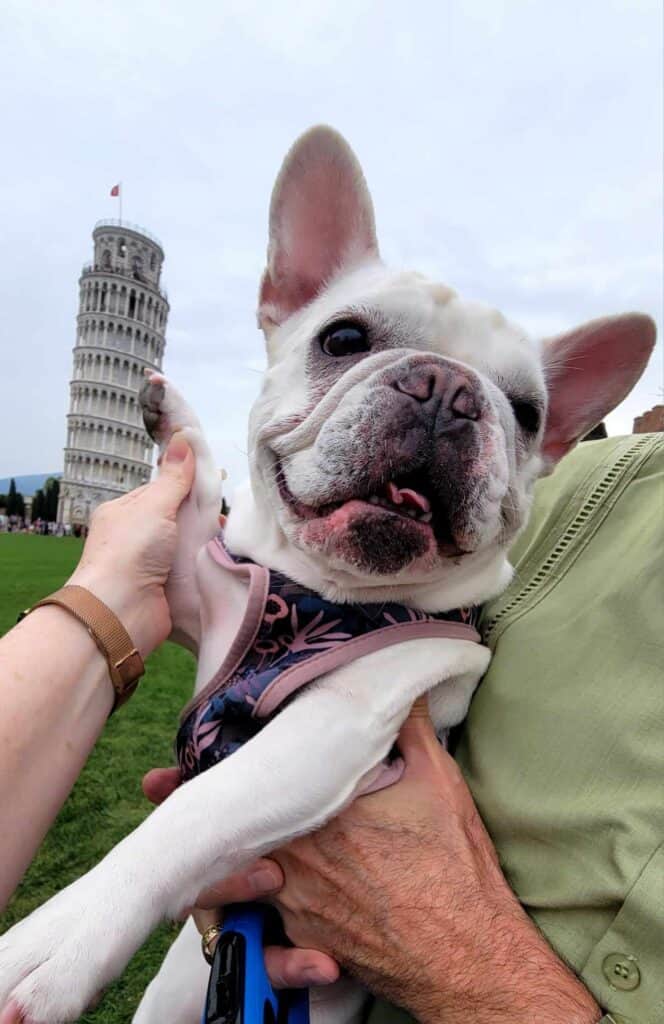
Traveling with a frenchie definitely requires research, extra planning, care, and consideration. Our beloved little bat-pigs are bred to be companion animals, so they are strongly bonded to us, making it really hard to leave them behind when we travel. Being separated from their humans can be really stressful for them, but only you know best whether the right thing to do is find a trusted caretaker, or bring them along to come enjoy your adventure with you!

Understanding the risks of air travel, having a conversation with your vet, doing your research with airlines, and exploring alternative travel options can keep your frenchie safe, happy, and part of the journey. Always always prioritize your frenchie’s well-being and you can create some really great memories, grab those fantastic photo opps, and enjoy your vacation without worry about your best friend!
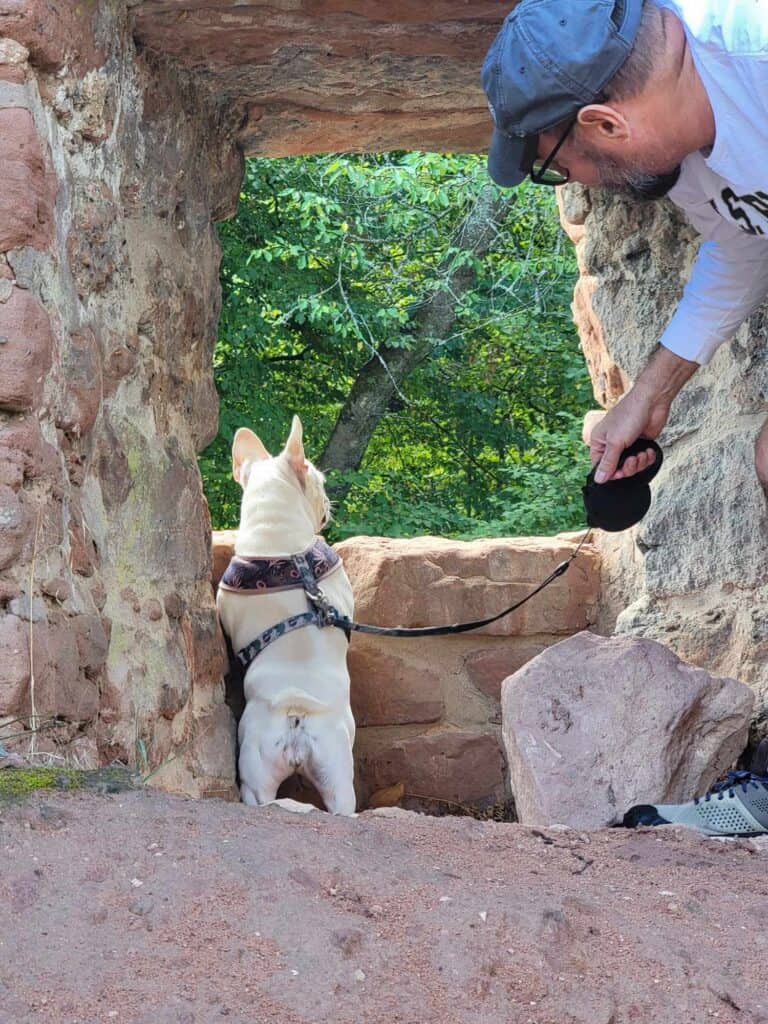
You may enjoy these related articles:
- How to Fly With Your Dog in Cabin – Top Tips!
- Can You Buy Your Dog a Seat on a Plane? These 10 Airlines Say Yes!
- Staying in a Hotel With Your Dog – Top Tips!
- European Airlines That Allow Dogs in Cabin: Your Ultimate Guide
- US Airlines That Allow Dogs in Cabin: Best Guide
- Traveling with a French Bulldog: Ultimate Summer Packing List
- Traveling with a Frenchie: Best Winter Packing List
- Flying Volotea Airlines With a Pet in Cabin – Your Comprehensive Guide
- Flying With a French Bulldog on Delta Airlines
- Flying Alaska Airlines With a Dog In Cabin
- Flying With a French Bulldog on Southwest Airlines
- Epic 16 day Italy Road Trip With Your Dog
And this page will take you to a list of dog-friendly European hotel reviews!
